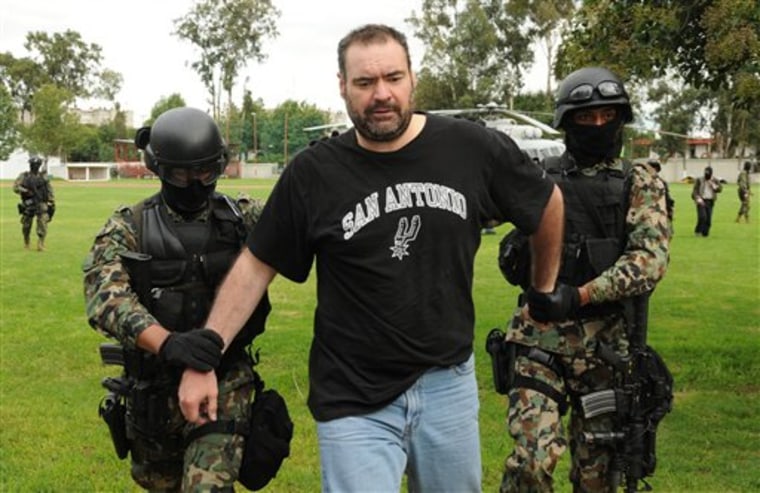Mexican special forces marines captured Sergio Villarreal Barragan, allegedly a top member of the embattled Beltran Leyva cartel who appears on a list of the country's most-wanted fugitives, in a raid Sunday in the central state of Puebla, the government said.
Villarreal, known as "El Grande," did not put up any resistance when he was arrested along with two accomplices as they left a residence in Puebla city, according to government security spokesman Alejandro Poire. The raid involved 30 Navy marines, five vehicles and a helicopter.
"This is a new and resounding blow by the federal government against crime, given the high rank and dangerousness of this person inside one of the country's most extensive criminal organizations which has been deeply weakened," Poire said in a statement.
The marines had already taken control of the high-end gated community called "Puerta de Hierro," or Iron Door, minutes before storming the house, according to Mexican newspaper El Universal. The military asked Villarreal's neighbors to close their doors and hide in the most secure parts of their homes, the paper added in a story on its website.
The 30 marines involved didn't fire a bullet because Villarreal handed himself over without a struggle, the newspaper reported.
Neighbors told journalists from El Universal that El Grande's home, a sprawling Moorish structure with domes and arches, reminded them of a hotel complex. Inside, it appeared that preparations were being made for a children's party. Marines found maps of El Grande's supply routes in the states of Puebla, Morelos and beyond on the floors of some rooms, the newspaper reported.
According to El Universal, Marines took about 3 suitcases from the home, although they left two Schnauzer dogs.
Fourth major blow
Villarreal's capture is the fourth major blow delivered to drug cartels by the government of President Felipe Calderon in the past year.
First came the death of Arturo Beltran Leyva, the top leader of Beltran Leyva cartel, in a raid outside Mexico City on Dec. 16, 2009. Then soldiers killed the Sinaloa cartel's No. 3 capo, Ignacio "Nacho" Coronel, on July 29. And on Aug. 30 federal police announced the capture of Edgar Valdez Villarreal, alias "La Barbie." The two men are not related.
Villarreal, an enemy of La Barbie's, appears on an Attorney General's Office list of Mexico's most-wanted drug traffickers and has a reward of just over $2 million for his capture.
He is listed as one of the top remaining leaders of the Beltran Leyva cartel following the death of Arturo, who was known as the "Boss of Bosses," and the arrest of "La Barbie," a former Beltran Leyva hitman and operative.
Poire said the Beltran Leyvas "had constituted one of the groups with the largest presence in the country," conducting operations in 32 Mexican states, including the capital.
But troubles began when Alfredo Beltran Leyva was arrested in 2008. Then the death of his brother Arturo the following year splintered the cartel, launching a brutal war for control of the gang, involving mass executions and beheadings in once-peaceful parts of central Mexico. Carlos Beltran Leyva was arrested a few days after Arturo's death.
The fight for the remains of the cartel pitted Hector Beltran Leyva and Villarreal against a faction led by "La Barbie." Hector is the last Beltran Leyva brother at large.
The Beltran Leyva brothers once formed a part of the Sinaloa cartel, but broke away following a dispute. An indication of the problems they face is that three of the four main blows dealt to drug gangs in the past year involve Beltran Leyva leaders or operatives.
More than 28,000 people have been killed in Mexico since December 2006, when President Felipe Calderon launched a military offensive against the cartels soon after taking office.
Suspected drug hitmen killed 25 people late last week in the U.S.-Mexico border city of Ciudad Juarez in what was the bloodiest day in almost three years for a major manufacturing hub gripped by an escalating drug war.
A separate operation by the federal police in the northern state of Tamaulipas on Saturday led to the discovery of a weapons cache that included dozens of guns and 90 grenades, authorities said on Sunday evening.
In the central state of Morelos, police discovered nine bodies in clandestine graves Saturday in the same area where four more were recently found.
The Public Safety Department said in a separate statement that all 13 victims were believed to have been killed on the orders of "La Barbie" in his battle for control of the cartel.
Filing charges against troops
Also Sunday, the military announced that it filed charges against four troops for the Sept. 5 shooting deaths of a man and his 15-year-old son along the highway linking the northern city of Monterrey to Laredo, Texas.
Authorities have said soldiers opened fire on the family vehicle when it failed to stop at a checkpoint, though relatives who were also in the car say they were shot at after they passed a military convoy.
The mother and wife of the two victims was also wounded in the shooting.
A captain, a corporal and two infantrymen are in custody in military prison and have been charged with homicide, the Defense Department said in a statement.
Mexico's military was already under scrutiny for this year's killings of two brothers, ages 5 and 9, on a highway in Tamaulipas, a state bordering Nuevo Leon.
The National Human Rights Commission has accused soldiers of shooting the children and altering the scene to try to pin the deaths on drug cartel gunmen.
The army denies the allegations and says the boys were killed in the crossfire of a shootout between soldiers and suspected traffickers.
The scandal renewed demands from activists that civilian authorities, not the army, investigate human rights cases involving the military.
